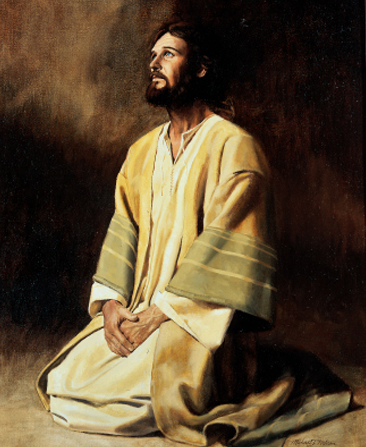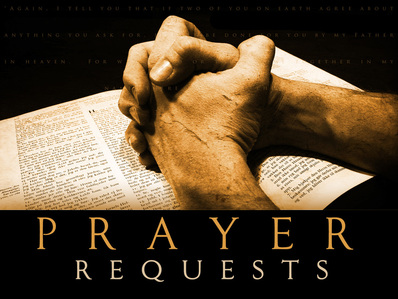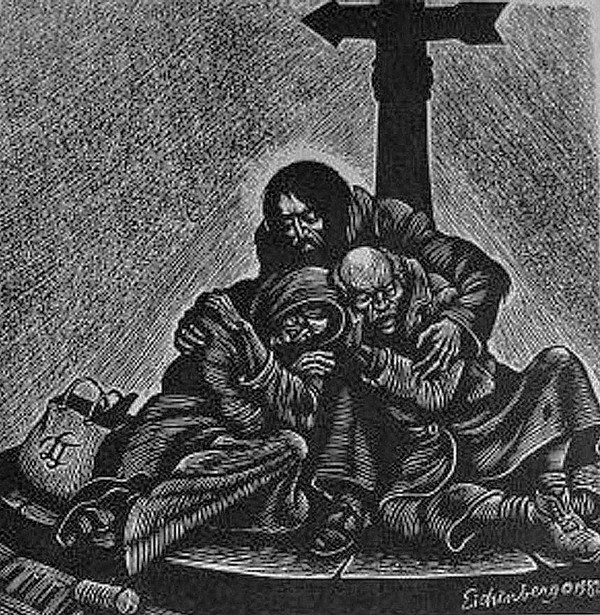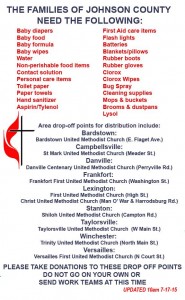I (Bruce) am going with David Miller, campus minister from Union College, this Saturday to help deliver some supplies collected at Union and at Grace on the HIll. If anyone wants to collect some supplies and either drop them off at the church by Friday, I can pick them up to put in with this trip, or meet us at Grace on the HIll on Saturday (we are leaving from Union at about 8:00 am to head to Corbin), please let me know.
This Sunday (July 19, 2015) at St. John’s

Jesus Kneeling in Prayer and Meditation, by Michael Jarvis Nelson
After saying farewell to them, he went up on the mountain to pray. (Mark 6:46)
Jesus frequently took time to pray. Often he would seek out deserted places to spend time with the Father. How is your prayer life? Do you set aside regular times to pray? When was the last time you spent some time in solitude and prayer? Prayer time can be any time. Some people find their morning or evening commutes to be conducive to prayer. A quiet hike through the woods can be a good way to set aside some time in solitude to speak with God and listen for God’s guidance. Remember that silence is an important component of prayer. When visiting with a friend, we are often silent as we listen to what she or he has to say. I knew some of my friendship were particularly close when we could be together in a companionable silence and didn’t feel we needed to fill that silence with words. Spending time not only speaking with God about what is on our hearts and minds, but also allowing ourselves to be quiet and listen for God to respond can be very fruitful in prayer.
News & Notes
Pastoral Needs: If a pastoral need arises, please call the church office at 606-528-1659 and leave a message. Voicemail messages will automatically be forwarded to a member of the vestry who can arrange pastoral care. You may also contact the senior warden, Bruce W. Cory, by phone at 440-227-0035 or by e-mail at bwcory@gmail.com
This Sunday: This Sunday the Rev. Dana Lockhart from the joint Lutheran-Episcopal Campus Ministry of St. Augustine’s at the University of Kentucky will be joining us for the Adult Forum and Eucharist.
Next Sunday: We will be having a service of Holy Eucharist. The Rev. Terry Taylor will be presiding.
Pot Luck Sunday: Next Sunday, J, July 26 our monthly pot luck. Bring a dish or drink to share. And all are welcome! Plan to fellowship with each other.
Adult Forum: Each Sunday through July we continue a summer series on the Gospel of Mark.
Al-Anon Family Group: An Al-Anon Family Group will meet in St. John’s Parish Hall on Tuesdays from 7-8pm.
Wednesday Fellowship: Gather at 6pm on Wednesday evenings for a service and fellowship.
Fun, fun, fun. The next Family Game Night is July 24, 6:30 – 8:30pm. Bring your favorite games, snacks, and drinks. Pizza will be provided.
|
June 2015 (4 Sundays) |
Budget YTD |
Actual YTD |
Monthly Budget |
Actual Monthly |
|
Total Revenue |
$25,813 |
$29,482 |
$4, 302 |
$5,600 |
|
Total Expense |
$25,813 |
$26,962 |
$4, 302 |
$4,165 |
|
Difference |
$2,520 |
$1,435 |
Link your Kroger Rewards Card to St. John’s Church! Re-enrollment occurs August 1-31! St. John’s receives a portion of what you spend at Kroger. The amount is distributed quarterly. Support St. John’s by linking your card to St. John’s.
God’s Pantry sponsors a senior food program through Corbin Presbyterian Church that unloads, packs and distributes food to 312 low income seniors in our area. The truck load of food (about 10,000 pounds) arrives at the church on the 4th Monday of each month (July 27) about 10:00, and the cases of food are unloaded and stacked in the church fellowship hall. The next night (July 28) at 6:00 we get together and pack the food into 312 boxes. Then, Wednesday, July 29, from 9:00 to 12:30 is the great day when the seniors come to the church to pick up their food and we desperately need people who can carry the boxes to their cars. All of this is labor intensive, and requires some lifting on Monday and Wednesday. On Tuesday we pack the boxes in an assembly line. We are acutely aware that most people who can do this easily are working on Monday and Wednesday, but we would certainly welcome any help we can get!
St. John’s Statement of Inclusion
St. John’s Episcopal Church, Corbin, KY, is a proudly inclusive Christian community. All members are encouraged to participate fully in the life and leadership of the church regardless of age, race, ethnicity, culture, gender, sexual orientation, economic condition, physical or mental ability. We believe all people are created by God to model the diversity in unity which is the Holy Trinity and we seek to live out that diversity in unity within the faith community.
This Sunday (July 12, 2015) at St. John’s
 Blessed be the God and Father of our Lord Jesus Christ, who has blessed us in Christ with every spiritual blessing in the heavenly places, just as he chose us in Christ before the foundation of the world to be holy and blameless before him in love. (Ephesians 1:3-4)
Blessed be the God and Father of our Lord Jesus Christ, who has blessed us in Christ with every spiritual blessing in the heavenly places, just as he chose us in Christ before the foundation of the world to be holy and blameless before him in love. (Ephesians 1:3-4)
We have been blessed in Christ with “every spiritual blessing in the heavenly places.” Maybe this week I need to look around me more intently to see the blessings I have received and give thanks to God for all these good gifts.
News & Notes
Pastoral Needs: If a pastoral need arises, please call the church office at 606-528-1659 and leave a message. Voicemail messages will automatically be forwarded to a member of the vestry who can arrange pastoral care. You may also contact the senior warden, Bruce W. Cory, by phone at 440-227-0035 or by e-mail at bwcory@gmail.com
This Sunday: We will be having a service of Holy Eucharist (Communion). The Rev. Terry Taylor will be officiating.
Next Sunday: We will be having a service of Holy Eucharist. Pastor Dana Larkin from the joint Episcopal/Lutheran campus ministry of St. Augustine will be presiding.
Adult Forum: Each Sunday through July we continue a summer series on the Gospel of Mark.
Al-Anon Family Group: An Al-Anon Family Group will meet in St. John’s Parish Hall on Tuesdays from 7-8pm.
Wednesday Fellowship: Gather at 6pm on Wednesday evenings for a service and fellowship.
Fun, fun, fun. The next Family Game Night is July 24, 6:30 – 8:30pm. Bring your favorite games, snacks, and drinks. Pizza will be provided.
Link your Kroger Rewards Card to St. John’s Church! Re-enrollment occurs August 1-31! St. John’s receives a portion of what you spend at Kroger. The amount is distributed quarterly. Support St. John’s by linking your card to St. John’s.
The Vestry has voted to donate $25 each month to Everlasting Arm Homeless Shelter. If you’d like to contribute, put your donations in the collection box by the guest register or mark your donation and put it in the collection plate.
Hymn Selection Group If you’d like to choose hymns for services, join this group. You will choose hymns for an upcoming service and then meet with the entire group to confirm the final selections. See Billy Hibbitts if you are interested.
Would you like to write Prayers of the People? If you are interested in writing these prayers (there are resources that can help with this task), please let Bruce know by phone or e-mail.
Are you interested in assisting with the Sunday service? Readers, Eucharistic Ministers, Crucifers, Altar Guild Members and choir members are all important for each Sunday service. If you’re interested in serving, please let Bruce know by phone or e-mail.
Serving Our Neighbors – See baskets in the parlor.
- Everlasting Arms, Corbin’s shelter for people who are homeless, is in need of men’s and women’s razors, gloves, deodorant and socks.
- The Food Pantry at Corbin Presbyterian Church is always in need of nonperishable food items. Vegetables are especially appreciated.
St. John’s Statement of Inclusion
St. John’s Episcopal Church, Corbin, KY, is a proudly inclusive Christian community. All members are encouraged to participate fully in the life and leadership of the church regardless of age, race, ethnicity, culture, gender, sexual orientation, economic condition, physical or mental ability. We believe all people are created by God to model the diversity in unity which is the Holy Trinity and we seek to live out that diversity in unity within the faith community.
Follow us on Facebook, Twitter, Pinterest and subscribe to our Website feed!
Facebook: https://www.facebook.com/StJohnsCorbin
Twitter: https://twitter.com/StJohnsCorbin
Website: http://www.stjohnscorbin.org/
Pinterest: http://www.pinterest.com/stjohnscorbin/
“The Authority of Weakness” – Sermon (July 5, 2015 – Proper B9: II Cor 12:2-10)
St. Paul in his second letter to the Corinthians is struggling to maintain his authority within the Corinthian community he founded. After his visit and evangelization of Corinth, others had arrived preaching a variation on the gospel Paul had initially preached, probably a variation that placed emphasis on the following of Jewish ritual laws. These “super-apostles,” as Paul calls them later in II Cor. 12:12, point to mystical experiences and great acts of power as evidence for their authority. Paul, in defending his authority in the Corinthian community, does not deny his ability to lay claim to similar mystical experiences and acts of power, but instead places emphasis on the sacrifices he has made on behalf of the gospel as the mark of his authority.
St. Paul’s statement in II Corinthians 12:10 is paradoxical. He states, “Therefore I am content with weaknesses, insults, hardships, persecutions, and calamities for the sake of Christ; for whenever I am weak, then I am strong.” I am not often content with those things. Weakness I can deal with. I know, to some extent, my limits. Hardships and calamities I can deal with, too, as they seem to be the nature of the human experience. Admittedly, some people have more hardships than others, and sometimes I become irritated with the unfairness of how some seem to suffer more intensely than others. My hardships being, to return to a theme from an earlier reflection, relative “tempests in teacups” compared to those of others also helps me handle them with relative equanimity.
It is the insults and persecutions that get to me the most. There is a malevolent intentionality behind these. On these counts, too, I am relatively fortunate. I do not suffer persecution, and rarely encounter insults. Of course, that is because I am perceived as a member of the preferred group in our society. I am perceived, and therefore treated, as a white, educated, middle class, gender conforming male. As such, I avoid the insults and persecutions that others may suffer.
This week, however, I came face-to-face with just how much my privileged position clouds my impressions, and the way I speak, of the experience of the marginalized other. I was also challenged as to whether I had any right to speak out on behalf of the marginalized other, and I would like to address my responsibility to speak out on behalf of the other first.
There are two forces that compel me to speak out. First, I believe firmly that the gospel compels all followers of Christ to not only seek out and embrace the marginalized other, but we are also instructed to act in their interest. Latin American liberation theology calls this a “preferential option for the poor.” When we are empowered to make decisions and take action we are compelled to consider first and foremost how our decisions and actions will impact the poor. I interpret “the poor” as all who are disenfranchised in society, whether economically, socially, politically or in any manner. This is also what I mean by the “marginalized other,” a person who has been pushed to the edges of society.
Beyond the gospel mandate for a preferential option for the poor, I also believe that those of us who do live within the privileged classes of society have a responsibility to confront the systems that grant us privilege at the expense of the marginalized, using our privileged position on their behalf. I have my privileged position in society through very little merit of my own. Yes, I did work hard for my education, and I do work hard for my current economic position, but I also had access to these opportunities for hard work partially because of the privileged context of my birth. Were I born in a different context, I might not have had the opportunities of which I now take active advantage. I think of all those people born in developing countries who lack access to the many resources we in the United States take so much for granted. What would have been my chances to be where I am today were I born in such a context? Did I “earn” the context of my birth, and therefore did they “deserve” theirs for some reason? I think not.
But I digress too much. This past week while reading about the tragic burning of eight black churches in ten days I became impassioned to join my voice to those crying out with the question of “#WhoIsBurningBlackChurches”. Some answers to the causes of the fires have been discovered. A fire at Fruitland Presbyterian in Gibson County TN, has been attributed to lightening, and another at Greater Miracle Apostolic Church in Tallahassee, FL, has been attributed an electrical fire caused by a fallen tree. The fire that finally broke national news silence at Mount Zion African Methodist Episcopal Church in Greeleyville, SC, has also been ruled as caused by lightening. At least three of the fires, including the one at nearby College Hill Seventh Day Adventist Church in Knoxville, TN, are being investigated as arsons. That still leaves two fires with undetermined causes.
Social media networks, particularly Twitter, came alive with indignation that the mainstream media had not been reporting on these fires. In joining my voice to the outrage about the media silence, I raised the snarky question about why the media was not reporting on this recent “attack on religion.” I was immediately challenged that this was not an attack on religion but an attack on blacks. I initially defended my statement, wanting to use the rhetoric of the “attack on religion” to shine the light on the problem. However, I also began to reflect on how my position of privilege and my use of language were leading me to appropriate the experience of the black community and universalize it as an attack on religion rather than recognizing the reality that it was not an attack on religion, even though the specific targets in this instance were churches, but was rather an attack on black men and women through the medium of their places of worship. This same difficulty arises when one rephrases the “black lives matter” slogan as “all lives matter.” “All lives matter” ignores that the black community’s experience says that their lives are devalued. The cry “black lives matter” is a cry of pain and anger in the face of systemic discrimination against black lives. When I, as a white man, say, “Oh yes, I know. All lives matter” I am minimizing this cry of pain and anger by subsuming and universalizing the message, even if that is not my intention.
When we hear questions like “#WhoIsBurningBlackChurches” and statements like “black lives matter,” we need to be careful not to try to universalize the statement or discount it. These are profound cries of a community that knows firsthand what St. Paul is saying about the experience of insults, hardships, persecutions and calamities. We need to listen like the Corinthian community to the message and allow the other to speak with authority just as St. Paul claimed the authority of apostleship from his experiences. We also need to be wary of allowing our positions of privilege to cloud the message we are hearing or to misrepresent the voice of the marginalized. When we speak from privilege we make the mistake of the “super apostles” in relying on our privilege. When we listen with our whole heart and allow the pain and anger of the experience to touch our deepest being, then we can join hands with those who have experienced marginalization and together experience the promise of the Lord when he said, “My grace is sufficient for you, for power is made perfect through weakness.” (II Cor. 2:9).
This Sunday (July 5, 2015) at St. John’s
 “Therefore I am content with weaknesses, insults, hardships, persecutions, and calamities for the sake of Christ; for whenever I am weak, then I am strong.” (II Corinthians 12:10)
“Therefore I am content with weaknesses, insults, hardships, persecutions, and calamities for the sake of Christ; for whenever I am weak, then I am strong.” (II Corinthians 12:10)
I can’t think of anyone who is happy about weaknesses, insults, hardships, persecutions, and calamities, so Paul’s assertion of his being content with them is disturbing. I can tolerate my own weakness. Hardships and calamities tend to just happen. It is the insults and persecutions that upset me the most, whether they happen to me or to another. Insults and persecutions have a definite malevolent intention behind them. In the face of all of these, however, we are confronted with our personal weakness and must rely on the strength that comes from God to deal with them. Maybe it is in that strength that Paul is able to rest content.
News & Notes
Pastoral Needs: If a pastoral need arises, please call the church office at 606-528-1659 and leave a message. Voicemail messages will automatically be forwarded to a member of the vestry who can arrange pastoral care. You may also contact the senior warden, Bruce W. Cory, by phone at 440-227-0035 or by e-mail at bwcory@gmail.com
Next Sunday: We will be having a service of Holy Eucharist. The Rev. Terry Taylor will be presiding.
Adult Forum: Each Sunday through July we continue a summer series on the Gospel of Mark.
Al-Anon Family Group: An Al-Anon Family Group will meet in St. John’s Parish Hall on Tuesdays from 7-8pm.
Wednesday Fellowship: Gather at 6pm on Wednesday evenings for a service and fellowship.
Family Game Night: The next Family Game Night will be a family movie night, possibly outdoors, 6:30-8:30pm, June 26. Bring your favorite snacks and drinks.
St. John’s Statement of Inclusion
St. John’s Episcopal Church, Corbin, KY, is a proudly inclusive Christian community. All members are encouraged to participate fully in the life and leadership of the church regardless of age, race, ethnicity, culture, gender, sexual orientation, economic condition, physical or mental ability. We believe all people are created by God to model the diversity in unity which is the Holy Trinity and we seek to live out that diversity in unity within the faith community.
Follow us on Facebook, Twitter, Pinterest and subscribe to our Website feed!
Facebook: https://www.facebook.com/StJohnsCorbin
Twitter: https://twitter.com/StJohnsCorbin
Website: http://www.stjohnscorbin.org/
Pinterest: http://www.pinterest.com/stjohnscorbin/
Evening Prayer
 Don’t forget that we have returned to offering Evening Prayer on Wednesdays at 6:00 pm at the church. Come and join us if you are able.
Don’t forget that we have returned to offering Evening Prayer on Wednesdays at 6:00 pm at the church. Come and join us if you are able.
Evening Prayer is a short worship service that marks the end of the day. If you cannot join us in person, there are versions of Evening Prayer that you can pray in the Book of Common Prayer. The Prayer Book has a section titled Daily Devotions for Individuals and Families that begins on page 136, with a service for In the Early Evening on page 139. This is a simple order of prayer that I highly recommend as a starting place if you are not comfortable with the larger Evening Prayer service, which can be found on page 115 for Rite II (contemporary language) or page 61 for Rite I (traditional language).
An Order of Compline, found on page 127, is also a simple evening service, usually prayed before bedtime.
There are also resources for the daily prayer online. One of my favorites (though bit advanced as it offers several options) is St. Bede’s Breviary. The Mission of St. Clare also has some online, preformatted versions of Morning Prayer and Evening Prayer (including from the New Zealand Prayer Book and in español.) The Book of Common Prayer is also available online.
Or, you could take 10-15 minutes for quiet prayer, scripture reading and thought. Whatever you choose to do, whether it is with us at the church, with the Prayer Book, with an online devotional, or your own private prayer time, a discipline of personal and communal prayer is a valuable practice. One of the promise we make in the Baptismal Covenant is to “continue in the apostles’ teaching and fellowship, in the breaking of bread, and in the prayers”. I encourage you to find the pattern that works best for you to fulfill that promise.
NEW: Submission form for Prayers of the People
 A submission form has been created on the website for Prayers of the People. If you have a prayer request you would like added to the Prayers of the People during our Sunday services, please feel free to submit the request using this form.
A submission form has been created on the website for Prayers of the People. If you have a prayer request you would like added to the Prayers of the People during our Sunday services, please feel free to submit the request using this form.
You can make a submission by e-mail to bwcory@gmail.com , by submitting it in writing in the collection, or by talking with Bruce personally (and making sure he writes it down!).
Prayers will remain on the prayer list for one month from the date of submission. You are encouraged to resubmit the prayer request at that time to have it remain on the list for additional time.
“Becoming Empty That Others May Be Full” – Sermon (28 June 2015, Proper 8B, II Corinthians 8:7-15)

The Christ of the Homeless by Fritz Eichenberg
“For you know the generous act of our Lord Jesus Christ, that though he was rich, yet for your sakes he became poor, so that by his poverty you might become rich.” (II Corinthians 8:9)
This is one of my favorite concepts in theology. Kenosis – the concept that Christ, who was God and shared all the attributes of the Godhead, emptied himself of all being God entails to become one with humanity. Paul alludes to this idea again in the hymn found in Philippians 2:5-1:
Let the same mind be in you that was in Christ Jesus,
6 who, though he was in the form of God,
did not regard equality with God
as something to be exploited,
7 but emptied himself,
taking the form of a slave,
being born in human likeness.
And being found in human form,
8 he humbled himself
and became obedient to the point of death—
even death on a cross.
9 Therefore God also highly exalted him
and gave him the name
that is above every name,
10 so that at the name of Jesus
every knee should bend,
in heaven and on earth and under the earth,
11 and every tongue should confess
that Jesus Christ is Lord,
to the glory of God the Father.
In the Second Letter to the Corinthians Paul tells us that this self-emptying of Christ, his becoming poor, was so that we might become rich. Athanasius, the fourth century bishop of Alexandria, Egypt, and one of the great teachers of the church is quoted as saying, “The Son of God became man, that we might become god.” This idea, called theosis, does not mean we become “gods” in the same way that the Trinity is God, but that we becomes “partakers of the divine nature” as II Peter 1:4 states it. Through Christ’s emptying of all the prerogatives of Divinity he lifts up humanity, restoring it to its rightful place that was lost with the disobedience in the Garden of Eden.
Paul is using this self-sacrificing, self-emptying act of Christ to call upon the Corinthians to engage in a similar act of self-emptying and self-sacrifice. Paul is attempting to raise money to aid the community in Jerusalem. The region of Palestine had experienced a severe famine that crippled the economy and led to severe struggles for the believers in Jerusalem and its surrounding areas. Paul is calling on the communities he visits to provide economic relief for those struggling and in need. To the Corinthian community, he offers the example of the churches of Macedonia as a challenge. Despite their own struggles, the churches of Macedonia “gave according to their means, and even beyond their means” (II Cor. 8:3). Now Paul is asking the same of the Corinthian community, a community that excels in everything (II Cor. 7).
Although Paul upholds the model of Christ, who emptied himself of everything, becoming poor for their sake, he does not expect the Corinthians to give everything. In this he seems to moderate Jesus’ command to the rich young man to “sell all you have and give the money to the poor” (Mark 10:21). Instead he calls for giving in eagerness according to one’s means. Paul’s advice calls the Corinthians to examine their abundance, particularly in comparison to the poverty of others ,and give out of one’s abundance, for “it is a question of a fair balance between your present abundance and their need, so that their abundance may be for your need, in order that there may be a fair balance.” Paul is calling for a fair distribution of resources so that none may have too much nor too little.
Wealth distribution is a touchy topic in American society. A couple of years ago we had the Occupy movement challenging the 1% who held the majority of the wealth and giving voice to the discontent of the 99% who felt marginalized. Nothing has changed since then. 1% of the US population controls 43% of the US wealth. The next 4% control an additional 29% of the wealth. That leaves 28% of the US wealth to be shared with the bottom 95%.1
Let’s look a bit closer to home – Knox county. The median household income between 2009-2013 was $24,038. 34.7% of the population in Knox county live below the poverty level.2 Knox county is the 12th poorest county in the US when ranked by household median income.
Most of us in this church are fairly comfortable financially. Paul would say we have an abundance, even if we are not part of the 1%. Paul’s letter to the Corinthians should challenge us to look at those struggling in our community and give from our present abundance. The Christian faith has a tradition of the tithe – the giving of 10% of one’s income as first fruits. I would challenge us all to examine our practices of giving in light of Christ’s self-emptying and self-sacrifice of all that he was so that we might be made rich in him by being partakers of his divinity. Can we not empty ourselves of even 10% for those who are less fortunate than ourselves? I will admit – I struggle with this. The last I calculated my giving it was around 3%. I have been working on increasing my generosity. Each year I try to increase my giving by 10% of the previous year with the goal of eventually reaching that 10% tithe which is defined by the Episcopal Church as the “minimum standard of giving.”
I would also like to challenge the vestry to look at our communal budget in light of Christ’s self-sacrifice. What portion of the parish budget serves the needs of the poor, the hungry, and the homeless? We do send $25.00 a month from St. John’s to support a homeless shelter, and money collected in the “poor box” does go to Episcopal Relief and Development. What percentage of our budget is spent on our internal needs such as facilities upkeep, utilities, priest salary (when we have one)? I don’t want to discount these expenses, as they are important for our continued existence as a community, but do our budgets, personal and communal, reflect more an inward focus on our personal needs, or a self-emptying for the needs of others?
I will conclude with a selection from a homily on the Gospel of Luke by one of my favorite theologians, St. Basil the Great, a fourth century bishop of Caesarea:
What keeps you from giving now? Isn’t the poor person there? Aren’t your own warehouses full? Isn’t the reward promised? The command is clear: the hungry person is dying now, the naked person is freezing now, the person in debt is beaten now – and you want to wait until tomorrow? “I’m not doing any harm,” you say. “I just want to keep what I own, that’s all.” You own! You are like someone who sits down in a theater and keeps everyone else away, saying that what is there for everyone’s use is your own. If everyone took only what they needed and gave the rest to those in need, there would be no such thing as rich and poor. After all, didn’t you come into life naked, and won’t you return naked to the earth?
The bread in your cupboard belongs to the hungry person; the coat hanging unused in your closet belongs to the person who needs it; the shoes rotting in your closet belong to the person with no shoes; the money which you put in the bank belongs to the poor. You do wrong to everyone you could help, but fail to help.
1“Average America vs the One Percent.” 2015. Forbes. Accessed June 27.http://www.forbes.com/sites/moneywisewomen/2012/03/21/average-america-vs-the-one-percent/.
Potluck Reminder
 The announcement was omitted from last Sunday’s bulletin, but we are still having our regular end-of-the-month potluck lunch this Sunday, June 28. Bring a dish or drink to share. All are welcome! Plan to fellowship with each other. Our pot luck schedule shifts in October and November, depending upon the Bishop’s visit and our Annual Meeting, but otherwise it will remain as the last Sunday of the month.
The announcement was omitted from last Sunday’s bulletin, but we are still having our regular end-of-the-month potluck lunch this Sunday, June 28. Bring a dish or drink to share. All are welcome! Plan to fellowship with each other. Our pot luck schedule shifts in October and November, depending upon the Bishop’s visit and our Annual Meeting, but otherwise it will remain as the last Sunday of the month.
This Sunday (June 28, 2015) at St. John’s

Jesus of the Bread Line by Fritz Eichenberg
“The one who had much did not have too much,and the one who had little did not have too little.” (II Corinthians 8:15)
Paul is paraphrasing from Exodus 16:18, a passage that describes how God provided the Israelites with quail and manna in the desert. Within the context of Paul’s letter to the Corinthians advocating for a collection of relief for Jerusalem it sounds quite utopian. Today we can look around and see those with much who seem never to have enough, and those with little to have almost nothing at all. The selection from Paul’s letter should challenge us to be concerned about the distribution of wealth in our society and work toward this utopian ideal of adequate distribution of resources.
News & Notes
Pastoral Needs: If a pastoral need arises, please call the church office at 606-528-1659 and leave a message. Voicemail messages will automatically be forwarded to a member of the vestry who can arrange pastoral care. You may also contact the senior warden, Bruce W. Cory, by phone at 440-227-0035 or by e-mail at bwcory@gmail.com
This Sunday and next Sunday: We will be having a service of morning prayer. Jeff Davis will lead the service and Bruce W. Cory will preach.
Pot Luck Sunday: This Sunday is our monthly pot luck. Bring a dish or drink to share. And all are welcome! Plan to fellowship with each other.
Adult Forum: Each Sunday through July we continue a summer series on the Gospel of Mark.
Al-Anon Family Group: An Al-Anon Family Group will meet in St. John’s Parish Hall on Tuesdays from 7-8pm.
Wednesday Fellowship: Gather at 6pm on Wednesday evenings for a service and fellowship.
Family Game Night: The next Family Game Night will be a family movie night, possibly outdoors, 6:30-8:30pm, June 26. Bring your favorite snacks and drinks.
The installation of the Rev. Lisa René Eye: The Presbytery of Transylvania and Corbin Presbyterian Church invite you to the service of worship installing the Rev. Lisa René Eye as Pastor June 28 at 4:00 pm at Corbin Presbyterian Church, 601 Master St., Corbin, KY.
Follow us on Facebook, Twitter, Pinterest and subscribe to our Website feed!
Facebook: https://www.facebook.com/StJohnsCorbin
Twitter: https://twitter.com/StJohnsCorbin
Website: http://www.stjohnscorbin.org/
Pinterest: http://www.pinterest.com/stjohnscorbin/

